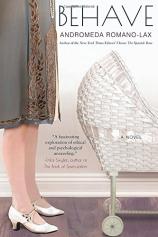Behave
Review
Behave
Andromeda Romano-Lax’s third novel, BEHAVE, opens with an eerie similarity to my own personal life: like her protagonist, the young, pioneering female scientist Rosalie Rayner, I too am a recent graduate of Vassar College. However, our shared alma mater is not the only point of connection that the author succeeds in establishing between her character and this reader. Rayner’s deeply introspective, first-person narration of her forays into early 20th-century behavioral psychology and subsequent relationship with the dynamic John B. Watson is enough to draw one into this troubling tale.
The novel opens with a brief rendering of Rayner’s four years at Vassar: her love for the college, her great passion for science and, ultimately, notes of discord upon reaching the end of her time there. She has distanced herself from her former best friend, Mary Cover Jones, who one day will be known as “the mother of behavior therapy,” and has become disillusioned with her idol, Professor Margaret Washburn, the first woman granted a Ph.D. in psychology. While clearly smart and charming, Rayner is predominately alone at Vassar, as she remains for much of her life. Perhaps, as the book not-so-lightly suggests, this is due to her being Jewish at a white, elite women’s institution. But as only a paucity of historical records on Rosalie Rayner exist, the majority of her life, her perceived loneliness and her melancholy over dreams deferred are up to speculation, which Romano-Lax does her best to unpack in 382 pages.
"Rosalie Rayner was a fascinating woman who unfortunately slipped through the cracks of history, but Andromeda Romano-Lax does her well-deserved justice through this heartfelt and intricate story."
Upon graduation, Rayner goes to work for John Watson, the chair of the psychology department at Johns Hopkins. There they conduct the infamous “Little Albert” experiment, which used classical conditioning to cause an infant to fear stimuli he would not normally be afraid of. Romano-Lax’s writing is at its best when describing Rayner’s emotional turmoil. She struggles with her desire to make a name for herself in psychology, her belief in the genius of her boss, and her guilt about deliberately traumatizing a baby for the sake of progress. This state is complicated even further when Watson, 20 years her senior, married with children and a notorious philanderer, seduces Rayner, and the two embark on an affair. When the truth finally comes out, Watson’s career in academia is all but ruined, and the Baltimore society papers smear Rayner’s name. Once his divorce is finalized, Watson and Rayner get married and move to New York, much against the wishes of the Rayner family. This is where her troubles truly begin.
After struggling financially for some time, Watson secures a job with a prestigious advertising agency and begins living the high life of an ad man. Rayner also wants a career in advertising, which she sees as a glamorous and progressive industry, as well as a more practical field of social science. However, her scandalous reputation precedes her, and job applications are cut short when she becomes pregnant. The two gradually settle into a traditional marriage, with Watson as the earner and Rayner the homemaker, although their union suffers from his frequent infidelities. Yet Rayner stays loyal to her simultaneously absent and oppressive husband and is even able to find some liberation in having affairs of her own. These flings do not stave off her feelings of insignificance when she compares her life to his achievements, and she becomes resentful of how his male privilege eclipsed her own rising star.
The climax of BEHAVE comes when Watson and Rayner publish the authoritarian PSYCHOLOGICAL CARE OF INFANT AND CHILD. Romano-Lax exposes the drama behind the writing of this book, which makes clear the differences between their respective beliefs on parenting. Watson remains bitter and unmoving until the end, while Rayner suffers from an enormous amount of doubt about the lasting effects of the experiments she so willingly participated in, as well as the implications her husband’s theories have for her own children.
Scientific ethics, feminism, family, sex, and the beginning and end of an American feeling of boundless progress all come out to play in BEHAVE. While the novel is plagued by an incessant use of rhetorical questions and often feels repetitive, it is ultimately an enjoyable read. Rosalie Rayner was a fascinating woman who unfortunately slipped through the cracks of history, but Andromeda Romano-Lax does her well-deserved justice through this heartfelt and intricate story.
Reviewed by Alex Bowditch (alexandra.bowditch@gmail.com) on April 1, 2016
Behave
- Publication Date: March 1, 2016
- Genres: Fiction, Historical Fiction
- Hardcover: 400 pages
- Publisher: Soho Press
- ISBN-10: 1616956534
- ISBN-13: 9781616956530





